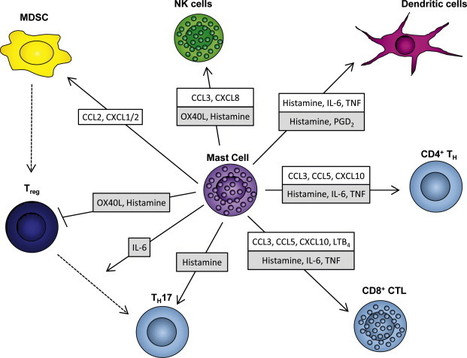Highlights
•
Mast cells are found in large numbers at solid tumor sites and can have both pro-tumorigenic and anti-tumorigenic roles.
•
Multiple pathways, including hypoxia, adenosine, TLR, antibody and complement, can activate mast cells in solid tumors.
•
Activated mast cells recruit immune effector and regulatory cells and mobilize dendritic cell responses.
•
Mast cells are excellent targets for cancer immunotherapy due to their location, prolonged lifespan and radio-resistance.
Abstract
Mast cells have historically been studied mainly in the context of allergic disease. In recent years, we have come to understand the critical importance of mast cells in tissue remodeling events and their role as sentinel cells in the induction and development of effective immune responses to infection. Studies of the role of mast cells in tumor immunity are more limited. The pro-tumorigenic role of mast cells has been widely reported. However, mast cell infiltration predicts improved prognosis in some cancers, suggesting that their prognostic value may be dependent on other variables. Such factors may include the nature of local mast cell subsets and the various activation stimuli present within the tumor microenvironment. Experimental models have highlighted the importance of mast cells in orchestrating the anti-tumor events that follow immunotherapies that target innate immunity. Mast cells are long-lived tissue resident cells that are abundant around many solid tumors and are radiation resistant making them unique candidates for combined treatment modalities. This review will examine some of the key roles of mast cells in tumor immunity, with a focus on potential immunotherapeutic interventions that harness the sentinel role of mast cells.
Via Krishan Maggon



 Your new post is loading...
Your new post is loading...








Volume 63, Issue 1, January 2015, Pages 113–124
Mast cell biology: new functions for an old cell
Review Mast cells as targets for immunotherapy of solid tumors ☆Sharon A. Oldforda, b, Jean S. Marshalla, b, , Show moreDOI: 10.1016/j.molimm.2014.02.020Under a Creative Commons DMCC